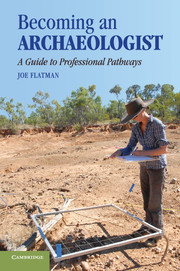Book contents
- Frontmatter
- Contents
- Tables and Figures
- Preface and Acknowledgments
- Introduction
- One What Is – and Isn't – Archaeology?
- Two Skills and Training
- Three Cultural Resource Management
- Four Academia
- Five Local Government
- Six Central Government
- Seven Public and Community Archaeology
- Conclusion
- Appendix 1 Useful Websites
- Appendix 2 Glossaries
- Appendix 3 Suggested Equipment to Take on an Archaeological Project
- References
- Index
Four - Academia
Published online by Cambridge University Press: 05 June 2012
- Frontmatter
- Contents
- Tables and Figures
- Preface and Acknowledgments
- Introduction
- One What Is – and Isn't – Archaeology?
- Two Skills and Training
- Three Cultural Resource Management
- Four Academia
- Five Local Government
- Six Central Government
- Seven Public and Community Archaeology
- Conclusion
- Appendix 1 Useful Websites
- Appendix 2 Glossaries
- Appendix 3 Suggested Equipment to Take on an Archaeological Project
- References
- Index
Summary
Introduction
In the public eye, the academic is the archetypal archaeologist who springs to mind when the career is mentioned – this is the path most people assume archaeologists take, either because there are thought to be the most jobs in this sector (wrong) or the best pay (partly right and partly wrong) or the best working conditions and status (again, both right and wrong). Ever since Professor Henry “Indiana” Jones Jr.'s academic credentials were highlighted in the movies of that franchise, the general perception is that at the end of the day, however dirty and tired the archaeologist may be, she or he will be stopping off at campus to drop off his kit and pick up mail on his way back from the field. As discussed in Chapter 1, for a very long time all the above assumptions would, in fact, have been correct. The first professional archaeologists were, arguably, academics – people with a formal educational background in classical, ancient, or medieval history who were employed by major academic-oriented organizations to work as archaeologists. This career is thus the origin of professional archaeology and thus also of the popular modern misconception of the definitive archaeologist.
Chapter 3 made clear, though, that the CRM archaeology world accounts for the vast majority of archaeological jobs these days, and also handles most of the money. Those in these academic posts are thus a lucky – I would emphasize that this does not necessarily equate with “elite” – few.
- Type
- Chapter
- Information
- Becoming an ArchaeologistA Guide to Professional Pathways, pp. 110 - 126Publisher: Cambridge University PressPrint publication year: 2011



